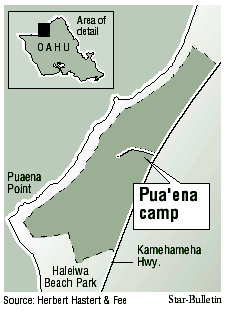

Courtesy photo
The new plans for the camp in Haleiwa call for
just 72 tents in the same area, instead of 252.
Fewer tents, however, would mean fewer jobs
would be generated, from an estimated
110 originally to 41 now.
Developers
propose smaller
North Shore
‘eco-camp’In response to pressure from
By Lori Tighe
nearby residents, the number
of tents on the 144-acre parcel
has been cut from 252 to 72
Star-BulletinThe "eco" from eco-camp has been dropped and the number of tents drastically reduced in the controversial camp planned for the North Shore.
Developers hope the changes also reduce the opposition.
"It's a pretty stripped down model," said Scott Ezer of the Honolulu planning firm Helber Hastert & Fee.
The firm submitted the proposed Pua'ena Camp's environmental impact statement to the city Monday for review.
Oahu's first major foray into ecotourism has been plagued by the question: Is it a camp or is it a resort? A vocal group of residents mainly on the affluent Papailoa Road near the proposed camp disliked it because they saw it as a thinly disguised resort on nonresort-zoned land along the Kawailoa shoreline.
Originally designed with 252 tents on 144 acres, the plan now calls for 72 tents. This allows for one tent per two acres.

The bulk of Pua'ena Camp, or 99.4 percent, will remain in open space."It's such a dramatic change," said Papailoa resident Tom Richie, president of TransPacific Mortgage Group, and whose family has lived on the North Shore for 80 years. "Frankly it was a bit of a shock."
"I applaud them for being responsive to community needs. I like 72 more than 252, that's for sure," he said laughing.
Gone are the cafeteria, swimming pool, two sundry stores, laundry facility, child care center, community pavilion, sport court and self-composting toilets.
The tents are grouped in the middle of the 144 acres, leaving plenty of room for a buffer zone between Papailoa residents, Ezer said.
The theme of ecotourism and sustainable development would remain in the scaled-down version, although the eco from eco-camp has been dropped.
"Eco brought a lot of derision from the community. They said the scale of the original camp belied the eco," Ezer said. "But the camp is still modeled after Stanley Selengut's eco-camps."
Selengut, a developer, has built award-winning eco-camps on the Caribbean island of St. John. He has taken a lower profile in the North Shore project, although he still is involved.
The number of 72 dwellings is allowed under the current agricultural zoning, Ezer said.
For the developer, Campers Villages, to afford the drastic reduction of tents, the prices per night will go up to around $150 to $160 a night. They were planned for $100 to $120 a night. Also the construction cost plummeted from an estimated $14 million to $5.5 million.
The number of jobs created by the camp has been reduced from 110 to 41 full-time positions.
To address public access to the shoreline, another concern of opponents, the new project added a public parking lot of 20 spaces on the Haleiwa Beach Park side. The lot would be turned over to the city for maintenance.
About 20 parking spots will also be reserved for the public in the campground parking lot.
The planners redesigned the tents as well. The original tents were criticized for resembling Weinberg Village, a Hawaii public housing project.